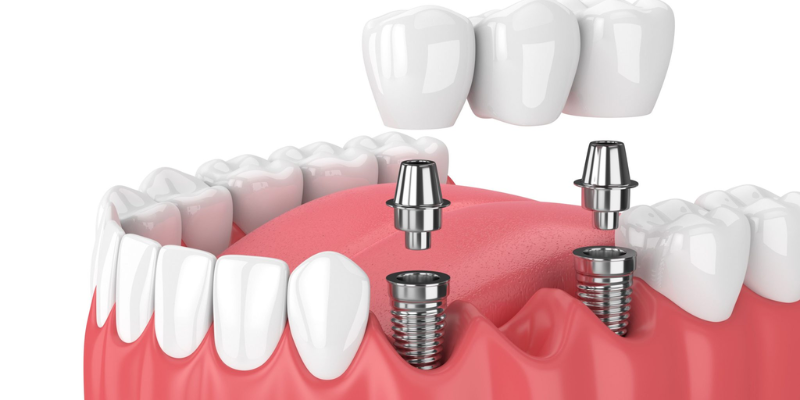Dental Implants Procedure
Dental Implants Procedure Client’s want to know ” dental implants before and after “. Implants are inanimate substances placed in the body or living tissues. Implants: are usually a titanium-based screw or root-shaped structures that are placed in open slots in the jawbone to restore the function. The bond between the dental implant and the living bone tissue is called osseointegration. The implant is made of titanium. Titanium does not cause the allergic reactions that the body normally has to foreign substances. Therefore, our body does not reject titanium implants. However, it is not correct to say that dental implant surgery is 100% successful. Infections that develop after inadequate oral care can lead to implant loss. Therefore, we explain that the success rate of implants is about 96%. It is not correct to give a time for the age of the implant.
Just as the retention of a natural tooth in the mouth depends on oral. And dental care and a person’s genetic characteristics, dental implants will be affected by similar factors. Our goal is for patients to use their implants for life. If good dental care is performed and oral controls are performed, when necessary, the implant will remain in the mouth. This process is considered too short if there is a sufficient amount and density of bone. During the operation, the area to be operated on is numbed with local anesthesia. During the treatment, the patient does not feel any pain. After the procedure is over, the patient is advised to take the necessary antibiotics. The transplant can also be done under sedation. It is preferable to use one of these two methods, especially in patients who are afraid and anxious about this procedure.
How Long Do Implants Last?
The most important factor in determining how long to use an implant place in a patient’s mouth is the patient’s care for routine care. Like all patients, implant patients should see their dentist every 6 months and have their teeth clean. If a problem is discover during these inspections, early intervention can prevent the problem from developing. Due to the high-tech production of implant materials, all materials used are import, so the cost is higher than that of traditional prostheses. Another disadvantage is waiting for the implant to fuse with the bone before applying the prosthesis, so treatment usually takes longer than other treatment options. Physical osteoporosis and oral osteoporosis are different health problems. Even if there is a high rate of osteoporosis in the body, it may be that there is good bone in the mouth.
Or even if there is the good bone in the body, the level of bone in the mouth may not be enough. Current research shows that the surgical placement of root implants is 99% successful over time. This is 70% in bridges in 11 years. Failure of this type of implant usually occurs within the first year after surgery. After this period, the implant rejection rate drops to 2% per year. The success of the treatment depends on the patient’s healing potential, smoking habits, oral hygiene status, presence of systemic diseases such as diabetes. The brand of implant use, and the doctor’s surgical skill. Every surgical intervention carries the risk of complications. These complications include hemorrhage and nasal cavity. These opportunities can be minimize with good screening and X-ray control. Three-dimensional visualization methods are effective in reducing complications.
Things To Consider After Implant
Dental Implants Procedure cooling the transplant area promotes healing and prevents swelling. Avoiding the impact and physical tension that damages the area enhances surgical success. By moving away from hard, particulate, and sticky foods, you are protect from the bacteria that form in your mouth. Paying attention to oral hygiene prevents the possibility of infection and promotes healing. Smoking and alcohol delay healing and should be avoid as much as possible. After fusing the implant to the jawbone, a permanent porcelain tooth or bridge is fix to the implant. After this stage, attention should be pay to oral hygiene such as brushing. And dental floss, and attention should be pay to the dentist’s management examination. Nothing to eat or drink within two hours of surgery. Avoid hot drinks for the first 24 hours and eat only soft cold food. Avoid hot food and drinks during the first week.
After surgery, it is recommend to apply mild pressure with a soft sterilize tampon to stimulate blood clotting and stop bleeding. In the first 24 hours, you can see the blood in the saliva – that’s normal. You can even see the blood on the pillow when you wake up in the morning. For the first 24 hours, do not lay your mouth to initiate the healing process of the area of the wound. Don’t brush your teeth tonight before surgery. After 35 hours, it is recommend that the throat be rinse with mouth twice a day for two weeks. Swallow your throat for two minutes and then do not eat or drink for 30 minutes. It is recommend not to smoke until the surgical site is completely heal. If your dentist has prescribed antibiotics.
Dental Implants Before and After
After starting implant treatment, before tooth extraction surgery, evaluate the patient’s film and understand the quality of the jaw. Then, the type of implant to use is up to the dentist. This step is very important because the shape and size of the implants are suitable for different situations. Again, the probability of encountering any negative outcome is very low since the person is inform of all the transactions to be make. Implants will be place after the extraction is complete.
Before placing an implant, oral hygiene must be ensure. Because the implantation of the implant is a purely surgical procedure and the sterilization provided in this procedure is very important. After providing the necessary hygiene, the dentist opens the gums in the area where the implants will be implant through a surgical operation. These implants are close with caulk screws and the open gums are suture again. After this operation, there is a waiting period of 1 to 3 months, and this waiting period may vary according to implant brands. Dental Implants Procedure
Why Choose Clinica, Hair Transplant Turkey?
Clinica Hair Transplant Turkey is the perfect choice for anyone looking for a safe, reliable, and proven hair transplant service. Founded in 2017 in Antalya, Clinica has quickly become one of the most sought-after names in the industry, offering an array of treatments to meet all types of needs. This includes FUE Method and DHI hair transplant techniques, as well as non-surgical treatments like PRP and mesotherapy. Clinica also offers services like rhinoplasty, dental, teeth whitening, and cosmetics, including surgical and/or non-invasive procedures.

Moreover, their team consists of highly experienced and qualified surgeons who specialize in hair restoration procedures. All Clinica services are tailored to provide excellent results with minimal downtime and natural-looking outcomes. With its state-of-the-art facilities and high dedication to client safety and satisfaction, Clinica continues to be an industry leader for those looking for quality hair restoration solutions. It is no wonder that Clinica’s name is becoming synonymous with successful hair transplants worldwide.
If you’re thinking about getting a hair transplant, look no further than Clinica Hair Transplant Turkey! Contact Clinica hair transplant Turkey today to book a free consultation and meet an expert in the field.



